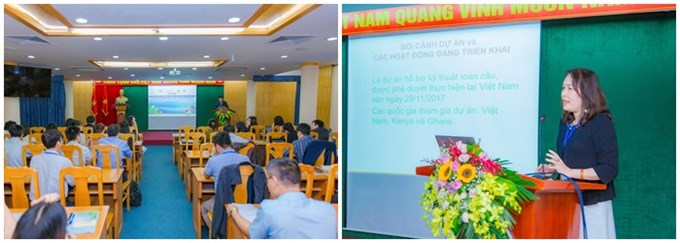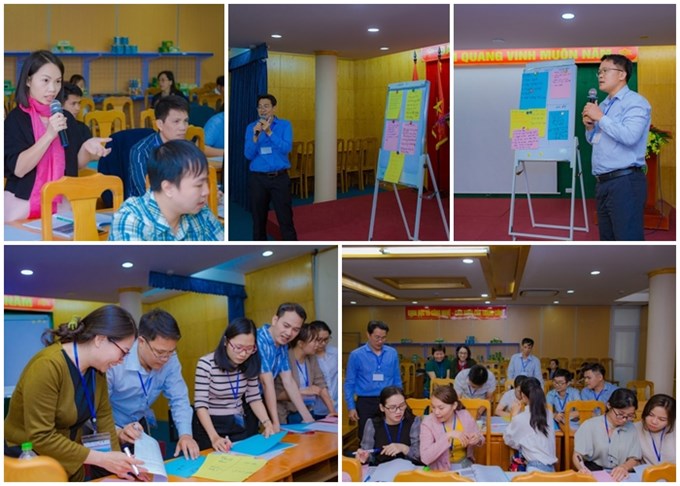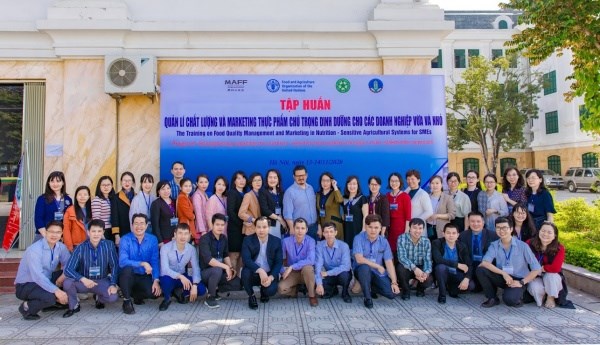Project GCP/GLO/712/JPN: The Training on Food Quality Management and Marketing in Nutrition-Sensitive Agricultural Systems for SMEs
Updated on 09:43, Monday, 14/12/2020 (GMT+7)
Vietnam National University of Agriculture (VNUA) collaborated with the United Nations Food and Agriculture Organization (FAO) in implementing the global project “Strengthening capacities for nutrition - sensitive food systems through a multi-stakeholder approach (involving private sector, civil society organizations and academia)” (GCP/GLO/712/JPN).
Vietnam National University of Agriculture (VNUA) collaborated with the United Nations Food and Agriculture Organization (FAO) in implementing the global project “Strengthening capacities for nutrition - sensitive food systems through a multi-stakeholder approach (involving private sector, civil society organizations and academia)” (GCP/GLO/712/JPN). The project's objective is to increase training on nutrition-focused food systems in universities and training institutions, private enterprises and state agencies in the agricultural sector. industry in Vietnam using Japanese expertise materials and FAO resources. The project's expectation is that people around the world receive healthy nutrition provided by sustainable food systems.
Within the framework of this project, Vietnam National University of Agriculture and FAO co-organized the training course on “Quality management and food marketing in nutrition-sensitive agricultural systems for small and medium enterprises” in two days from November 13 to November 14, 2020 at the university. The objectives of the training course are to: (i) develop knowledge and skills for SMEs in quality management and food safety and hygiene for fruit and vegetable products; and (ii) enhance businesses' capacity to market food, thereby contributing to increased profits for businesses in the context of nutrition-focused food systems.

The project management board delivers a speech about the training
The training course attracted 48 international and Vietnamese agencies and organizations in the public and private sectors, including nearly 40 small and medium enterprises operating in the supply chain of fruit and vegetable products from all three regions of the country.
With the limited training time, the experts from International Center for Tropical Agriculture (CIAT), Fruit and Vegetable Research Institute and Vietnam National University of Agriculture (Faculty of Accounting and Business Administration and Faculty of Food Technology) tried to deliver a condense amount of knowledge and skills on the following topics: food system concept with an emphasis on nutrition; food safety management system in Vietnam; good agricultural practices (GAP) codes for quality and safety management of vegetables and fruits; topics related to food marketing (market analysis and business planning, analyzing target customers and customer needs, competitors and alternative product analysis). The active interaction between trainers and trainees during the lectures and discussion created an exciting, attractive and effective atmosphere of the training course. In particular, this training course was organized for members to participate in two-way evaluation: trainers grasped the level of knowledge acquisition of trainees through quick tests, trainees evaluated the quality of the training and demonstrated the need for training on a food system that focuses on nutrition for themselves and their businesses. This was also a precious opportunity for businesses from different regions to meet, share experiences, exchange and cooperate for mutual development.

Discussion, knowledge and experience sharing between enterprises
With the positive assessments of the participants, along with the survey results on the training needs, this training course has an important meaning for the project in continuing to develop a plan for consulting and supporting enterprises in the near future. As a prestigious training institution, Vietnam National University of Agriculture continues to accompany enterprises in improving capacity and helping them to increase the value of food products towards nutrition-focus approach.

Participants in the training course